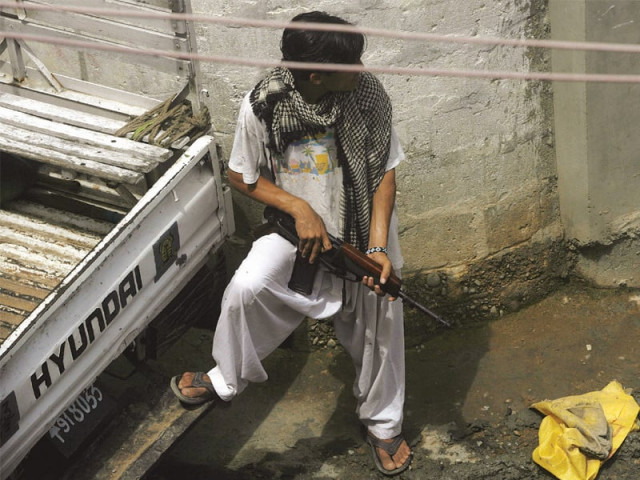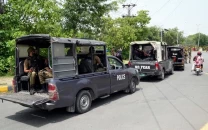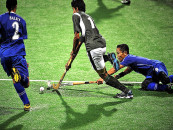Welcome to the jungle
The causes of this violence are many: political rivalry, sectarian tension, ethnic hatred, a bigger slice of the pie.

Welcome to the jungle
It is a sentiment that many of Karachi’s residents share. The city of lights seems more like a jungle full of predators: extortionists, drug lords, weapon dealers, the land mafia…the list goes on. These criminals jealously guard their turf and have allegedly formed links with political parties, making controlling the violence difficult, if not impossible.
“So is it a lost battle you are fighting?” I ask.
“No!” retorts Nasrullah, who battles target killing on a daily basis and has himself survived numerous shootouts. “The police is combating crime efficiently,” he claims, “which is evident from the numerous arrests and the seizure of illegal arms, the courts are overflowing with trials and the jails are overcrowded with all the people we have arrested.” The statistics Nasrullah offers in support of his claim are impressive, but there are other numbers as well, and they tell a different story.
The official police website lists the numbers of target killings for the month of March as 135. That’s twenty more than January, when ‘only’105 people were killed. According to the Human Rights Commission of Pakistan, target killings in the city have risen by 175 per cent from 2009 to 2010. Last year 748 people lost their lives on the violent streets of Karachi. Only 447 of them were political activists.
The causes of this violence are many: political rivalry, sectarian tension, ethnic hatred, and a bloody scramble to get a bigger slice of a multi-billion rupee pie.
“This is indeed a turf war,” says Nasrullah Khan. “There is a battle for drugs, for weapons, for confiscation of land, for extortion, for dominance — ultimately it’s a battle to own Karachi.”
Politics by other means
The political dimension is, of course, undeniable. The Muttahida Qaumi Movement and the Awami National Party share the coalition government in Sindh with the ruling Pakistan Peoples Party. This means that they also share the responsibility of governance and maintenance of law and order. Unfortunately, the political tensions and recurring wars of words between these coalition partners very often lead to a surge in violence in Karachi.
At an informal gathering at Mardan House in Karachi, I met ANP chief Asfandyar Wali Khan. This imposing Pashtun minced no words about the situation in Karachi, saying that no single political party should be allowed to dominate the city. He emphasised that the Pashtun presence in Karachi was a reality, as was the existence of other ethnicities.
However, Wali seems reluctant to lay blame at any one doorstep. Though he accepts that Karachi’s situation is “complex”, he rejects the view that the violence is because of the desire for political dominance by both the MQM and his own party. The ANP chief says that “elements” intending to destabilise the city were feeding on political strife and that neither the MQM nor the ANP were solely responsible for target killing.
Significantly, Wali believes it was the May12th carnage that changed the political dynamics of the city. Post-May 12th, Karachi has become far more polarised and vulnerable, says Wali. It is an assumption that many analysts agree with: May 12th sent a signal to political parties to strengthen their militant wings or find themselves on the receiving end of political violence. Very often, party workers chose to arm themselves or align with ‘sympathetic’ criminal groups for protection.
When asked to explain the criminal-political nexus, the possession of weapons and the “settling of scores” in the lower tiers of each political party, Wali took advantage of then Sindh Home Minister Zulfiqar Mirza’s presence, dramatically announcing that he had allowed Mirza to arrest anyone from the ANP who was found involved in target killings.
Though they are often at daggers drawn, the ANP and MQM now apparently seem to be in agreement that peaceful co-existence is the solution to Karachi’s problems. Sindh’s former advisor on Home Affairs Waseem Akhter, during his recent visit to Karachi, told me that the notion that every Pashtoon involved in criminal activities was an activist of the ANP and that every Urdu-speaking criminal was affiliated with the MQM, should be dispelled.
Unholy alliances
That may be the official stance, but the situation on the ground is somewhat different. The ‘unofficial’ affiliations of these criminals with the three major parties — the Pakistan Peoples Party (PPP), the Muttahida Quami Movement (MQM) and the Awami National Party (ANP) — which form the coalition government in Sindh, reinforce the criminal gangs. Police officials and analysts will privately tell you that this is a give and take relationship: the parties turn to these criminals when they need street power and weapons, and in turn the criminals demand protection when the noose tightens around them. These links do not even have to happen on a higher level. Very often it is the local party organisations that create the links, without the consent or even knowledge of the party leadership. But regardless of at what level the links are made, this nexus is very much to the advantage of the criminals.
The arrest of Ajmal Pahari in late March was a real feather in the cap of the Crime Investigation department (CID). Pahari — whose real name is Shahnawaz — was wanted in over 100 murders, and was allegedly involved in extortion and land-grabbing as well as murder.
But this was the second time that Pahari had been arrested. The notorious criminal was first charged with politically motivated killings across Karachi in 2000, but he was acquitted on all counts and walked free in 2005. Police claim that since then he has butchered over 50 more people.
A high-ranking police official I spoke with admitted, on condition of anonymity, that Pahari’s political affiliations served as a protective net for him, “The law in Pakistan resembles a spider’s web, spun to catch only small prey, but too flimsy for the big quarry.”
When elephants fight…it is the grass that gets trampled
Whatever the motive behind target killing, it is the average citizen who pays the price. Ordinary Karachiites are targeted for their ethnicity, their sect, their politics...and sometimes, just for being in the wrong place at the wrong time. That’s exactly what happened with 19-year-old Imran Hussain Katchi, a resident of Lyari. The sole breadwinner of the family and the apple of his mother’s eye, Imran was caught in the crossfire when an argument between rival gangs over erecting barriers erupted into violence.
Imran’s father says he know exactly who to blame. “The thugs of the People’s Aman Committee (PAC) are responsible for the murder of Imran,” declares a distraught Hussain Katchi. “These extortionists and murderers have made our lives miserable and the government supports them. When I went to the police to register Imran’s case, my brother, son and nephew were implicated in counter FIRs. The Katchi community is fed-up of the PAC and has decided to gang up against them under the banner of the Katchi Rabta Committee.”
He shows me the KRC’s office in Lyari, the exterior of which is riddled with bullet marks. I’m also shown an extortion slip with a name, cell number and the figure of Rs. 1000 inscribed on it. These slips not only make the rounds in Lyari but also in other areas of the city including the Shershah Market and SITE. Refusal to pay in cash or kind means that you will likely pay with your life instead.
Robbers or robin hoods?
The People’s Aman Committee is not only a thorn in the side of the Katchi community, it also upsets the Muttahida Qaumi Movement. When the former Sindh Home Minister Zulfiqar Mirza proclaimed that the PAC was a sister organisation of the PPP, the MQM protested by boycotting the proceedings in the Senate, National Assembly and Sindh Assembly. “The PAC is notorious for engaging in gang wars,” claimed the MQM’s Raza Haroon.”While the MQM has never supported terrorists, the PAC is involved in extortion, kidnapping and target killings.”
In what has become a frequent damage control exercise, the PPP saved the coalition by officially disbanding the PAC. And now Zulfiqar Mirza himself has been sent packing, apparently as a result of his animosity with the MQM.
Uzair Jan Baloch, chief of the now-defunct People’s Aman Committee, refutes the allegations leveled against him. “I am a victim of gang wars myself. My father was abducted in front of my eyes, some fifteen years ago. His dead body was found in Jahanabad in a sack. When I pursued his case, I was implicated in false cases including murders. I courted arrest in 2006 and after serving two years in jail, I initiated the People’s Aman Committee in Lyari. I am a social activist and the Aman Committee is a social welfare outfit,” claims Baloch. He says that he is a follower of Sardar Abdul Rehman Baloch aka Rehman Dakait. Often called the Robin Hood of Lyari, Rehman Dakait was a controversial figure who inspired both terror and reverence in equal measure. After he was killed in a police ‘encounter’, thousands of Lyari residents turned out for his funeral. Uzair Baloch says he is simply offering the residents of Lyari what Rehman Dakait once did, and what the public representatives of PPP never have: a better life.
To back up his claims, Uzair Baloch shows me three applications from the residents of Lyari. One is a request for payment of a student’s school fees in Australia, the other two also ask for monetary help due to lack of income and the absence of a breadwinner. Baloch claims he took care of all three applications. While touring Lyari with Uzair Baloch and his battalion of heavily-armed guards, I ponder over the reasons behind his larger-than-life image for the residents. Though he is accused of being a criminal, Baloch is received by men, women, children and elderly alike with seemingly genuine enthusiasm. “You have showed up after so many days, I missed you, my son,” says an elderly woman as she kisses Baloch on his forehead.
Years of administrative neglect have left Lyari so impoverished that it is not surprising that people find their heroes and saviours in people like Uzair Baloch or Rehman Dakait. “Lyari used to be a peaceful area but after General Musharraf’s takeover, we were systematically targeted and pushed to the wall. Lyari would only rattle with gun shots. The police operation in 2004 was also partisan, leaving us with nothing but dead bodies” says Uzair Baloch, as he recalls the operation that was launched in Lyari.
Baloch shrugs off all inquiries about his involvement in criminal activities. “Since the PPP has taken over in 2008, the people of Lyari have heaved a sigh of relief. We are striving to make Lyari livable. I am not running an extortion ring. On the contrary, I have personally caught many extortionists and target killers red-handed and handed them over to the police. I am making an effort to establish peace here,” claims Baloch.
When I ask him to clarify his position on the allegations levelled against him by the MQM and KRC, Baloch smiles and says, “You know that they are politically motivated”.
A melting pot for militants
The police official I spoke with admitted that the armed wings of political parties are engaged in a bloody turf war to establish their hold in Karachi. But they aren’t the only ones with a stake in Karachi. When I inquired about the nexus of religious extremists and criminal mafias taking advantage of the situation in Karachi, the official did not rule out the possibility.
“Karachi is a mega city and a commercial hub, generating billions of rupees in revenue. It definitely provides sanctuary to outlaws, who are hell-bent on destabilising the city so that they can continue their activities unchecked. Lately, the towns of Gadap and Orangi have become safe havens for Taliban renegades, many of whom are simply hired mercenaries.
The Anti-Extremist Cell and Counter Terrorism Units of the Crime Investigation Department are effectively hunting them down,” says the official. Indeed, the CID recently arrested two alleged TTP militants from Sohrab Goth who were engaged in collecting extortion money from people who hailed from the Mohmand agency and were working in Karachi’s Pashtun-dominated transport business. CID (Operations) SSP Fayyaz Khan says that along with extortion, they were also involved in target killings, kidnapping for ransom, robberies and other heinous crimes. Coming just a few months after the arrests of two other alleged TTP militants and a member of the Laskhar-i-Jhangvi, it was yet another sign of just how many groups with different agendas are operating in this city.
Of police paucity and judicial jams
The buck of maintaining law and order in Karachi has now passed on to Saud Mirza, the new head of the Karachi Police. Amidst this cycle of violence and police failure it is ironic that the slot of Karachi’s top cop has become a revolving door. The man on the top keeps changing, but the situation on the ground stays the same.
The official police website says that the sanctioned strength of police in Karachi is 28, 964, out of which the current working strength stands at 26, 873. According to these figures, with an estimated population of 18 million, this means there is one policeman for every 670 number of citizens. Unless that citizen happens to be a VVIP, of course; with approximately 5000 policemen deployed for their protection, the policeman to VVIP ratio is considerably better. “We cannot overcome a shortage of manpower in one day,” was Mirza’s response to my question during his first press conference after assuming office. “I am pursuing a one-point agenda, though — to apprehend target killers and bring them to justice.”
Mirza says that the Crime Investigation Department is tasked with chasing target killers and extortionists. But though arrests have been made, dead bodies still keep turning up.
The clear up rate for violent crimes in Karachi is also not satisfactory because of the sluggish judicial process. The police and prosecution lack the ability to produce evidence or witnesses before the court. Nine target killing suspects, despite their confession of involvement in the Shershah scrap market carnage in October last year, in which 13 shopkeepers were killed by indiscriminate firing, were acquitted by the court because of a lack of evidence and witness testimony. The SHC has now ordered the counsel and the petitioner to include the names of the acquitted men as respondents in the title of the petition so that they are issued notices and then a verdict can be reached
Nature abhors a vacuum
Bad governance and the political coalition partners’ disrespect for each others’ mandate is challenging Karachi’s peace. So long as political parties feel the need to maintain militant wings and ally themselves with criminals, the slightest spark will continue to set this city ablaze. The law enforcement agencies themselves suffer from endemic lawlessness and rampant corruption. On top of it, the police have lost credibility as it is perceived to be highly politicised. While the Paramilitary Rangers have shared the responsibility of maintaining the law with the police in Karachi for almost two decades now, even their performance has been sub-par.
The void left by the failure of law enforcing agencies, and the enduring insecurity of political parties offers space to criminal gangs to penetrate into the system, gaining a kind of credibility and support as they do. When the state abdicates its duties, others rise to fill the gap. Nature abhors a vacuum after all, and in such a vacuum, only the law of the jungle can prevail.
Published in The Express Tribune, Sunday Magazine, April 17th, 2011.



















COMMENTS
Comments are moderated and generally will be posted if they are on-topic and not abusive.
For more information, please see our Comments FAQ